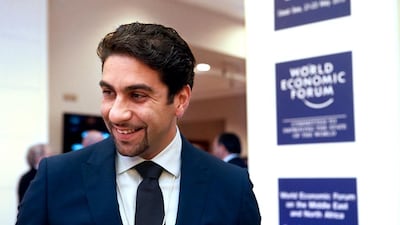Every participant at the World Economic Forum annual meeting in Davos seemed to be rushing around in a hectic whirl of important meetings, but Fahd Al Rasheed, the chief executive of the King Abdullah Economic City (Kaec) in Saudi Arabia, had a busier time than most.
His diary was crammed with more than 50 meetings in the four days of Davos, mostly with potential investors in the US$95 billion project to build an entirely new urban hub on the shores of the Red Sea, north of Jeddah.
“It’s been crazy, but I’m used to it now. And Davos is a great opportunity to see so many important people in a short space of time,” he said, during a brief lull in his investor schedule.
Kaec, which he verbalises as “cake”, is a flagship project of mind-boggling size for the kingdom. When it is completed, perhaps in 2035, it will have 2 million residents, and a lot more daily workers, spread across 70 square miles. It will be bigger than Washington DC.
It will have a major port, an industrial zone and residential and leisure facilities appropriate for such a metropolis.
Economically, Mr Al Rasheed sees Kaec rivalling the big trading cities of China and India; socially and culturally, it is whispered as the next Dubai in the Middle East.
As if this vast undertaking is not ambitious enough, Mr Al Rasheed took the opportunity in Switzerland to unveil his latest, complementary project: the Red Sea Foundation, a plan to make the region around one of the world’s great maritime highways into the next global boom zone.
“The potential of the Red Sea area is enormous and underdeveloped,” he says, reeling off statistics: the populations of the countries bordering the sea will double, to 1.3 billion by 2030, with a big rise in more affluent middle classes; regional GDP will rise five-fold to more than $6 trillion, as will the value of trade – most of it through the enlarged Suez Canal – to $4.7tn.
“It’s the fastest-growing region in the world,” says Mr Al Rasheed excitedly. “Just imagine Aqaba [the Jordanian port at the northern end of the Red Sea] becoming the hub for trade in the Levant and Iraq; imagine the benefits for East Africa in terms of food security, trade and commodities.”
At the moment, the foundation is a think tank that will be based in Geneva, Switzerland, with a full-time staff preparing policy documents advised by a global advisory board of business leaders and strategists. But he also talks of the need for a regional bank to fund the Red Sea region’s development.
And of course Kaec would be at the epicentre of this expanding region. But that depends on continuing progress in the project, which in turn depends on the appetite of international investors and the economic and political health of Saudi Arabia.
Kaec is run by a Tadawul-listed company in which Dubai's Emaar is a 33 per cent shareholder. It is chaired by Mohamed Alabbar, who is also Emaar's chairman. Mr Al Rasheed describes Emaar as Kaec's "anchor partner".
The project has been funded so far by a mixture of equity and debt, as well as the sale of property and land in the enormous development, and investment from third parties. It does not depend on Saudi government funding but, of course, the economic well-being of the kingdom is vital for its success. The declining oil price has recently cast some doubts on that.
Mr Al Rasheed thinks the gloom is exaggerated. “There has been a slowdown but the way some people are talking you’d think there will be a complete bust. That is just not happening. I think over the next five years there will be a retooling of the Saudi economy with focus on efficiency and competition, attracting foreign investors and the development of new industries like tourism,” he says.
Kaec will be part of that new direction, with its plan to attract more foreign tourists to the country. Saudi Arabia already pulls in 16 million tourists a year, mostly in the performance of their duties as Muslims, but the plan is to double that in the next half-decade by developing “Islamic tourism” – family holidays and cultural experiences.
Mr Al Rasheed admits that the first 10 years of Kaec has been a difficult time in the economic cycle but points to the progress that has been made: about 120 industrial companies are there, including some of the big names of international business such as Volvo, GE and Pfizer. There were 23 new ones last year, he says, “so there’s no evidence of a slowdown there”.
He believes the Saudi Arabian government’s commitment to economic reform can only accelerate the development. “Today in Saudi Arabia the government is exceptionally dynamic and is determined to drive results. What used to take a year now takes a month,” he says.
He also believes the planned privatisation programme of publicly owned assets will be a further spur to growth. “The government has significant assets in land and infrastructure which can be used to make money but also to boost efficiency and production. Mohammed bin Salman [the deputy crown prince, widely regarded as the driver of economic reform] has a good team around him and he will hold people accountable if they do not deliver results.”
The scale of the transformation envisaged by the Saudi plan has prompted a debate between progressives and traditionalists, but there seems little doubt as to which side Mr Al Rasheed – American-educated with a master’s degree in business from Stanford University – agrees with.
“I’ve been doing Kaec for 10 years but I’m not bored at all. I love it,” he says, before rushing off to another meeting.
fkane@thenational.ae
Follow The National's Business section on Twitter

